

Louis Moreau Gottschalk. Louis Moreau Gottschalk (May 8, 1829 – December 18, 1869) was an American composer and pianist, best known as a virtuoso performer of his own romantic piano works.[1] He spent most of his working career outside of the United States. Life and career[edit] Gottschalk was born in New Orleans to a Jewish businessman from London and a Creole mother. He had six brothers and sisters, five of whom were half-siblings by his father's mulatto mistress.[2] His family lived for a time in a tiny cottage at Royal and Esplanade in the Vieux Carré. Louis later moved in with relatives at 518 Conti Street; his maternal grandmother Bruslé and his nurse Sally had both been born in Saint-Domingue (known later as Haiti). Souvenir de Porto Rico. Souvenir de Porto Rico, Op. 31, is a musical composition for piano by American composer Louis Moreau Gottschalk written from 1857 during a tour in Puerto Rico. Dedicated to the Dutch piano virtuoso and salon music composer Ernest Henry Lubeck, and published in Mainz circa 1860 with the subtitle of Marche de Gibaros,[1] it is based on the Christmas folk song Si me dan pasteles, denmelos calientes, performed by local peasants known as Jíbaros.[2] The piece makes use of Latin-American and Afro-American melodies and rhythms almost fifty years before early ragtime and jazz would popularize its use.
History[edit] Souvenir de Porto Rico was written in the last trimester of 1857, when of Gottschalk's stay at the sugar plantation of English-born Mr. Cornelius Cartwright, in Plazuela.[4][n 1] At the time, Gottschalk was on vacation with singer Adelina Patti and her father. He would decide not to leave Puerto Rico, but instead remain there for weeks. Franz Liszt. Franz Liszt, T.O.S.F.
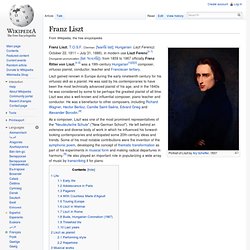
(German: [fʁant͡s lɪst]; Hungarian: Liszt Ferencz; October 22, 1811 – July 31, 1886), in modern use Liszt Ferenc[n 1] (Hungarian pronunciation: [list ˈfɛrɛnt͡s]); from 1859 to 1867 officially Franz Ritter von Liszt,[n 2] was a 19th-century Hungarian[1][2][3] composer, virtuoso pianist, conductor, teacher and Franciscan tertiary. Liszt gained renown in Europe during the early nineteenth century for his virtuosic skill as a pianist. He was said by his contemporaries to have been the most technically advanced pianist of his age, and in the 1840s he was considered by some to be perhaps the greatest pianist of all time. Liszt was also a well-known and influential composer, piano teacher and conductor. He was a benefactor to other composers, including Richard Wagner, Hector Berlioz, Camille Saint-Saëns, Edvard Grieg and Alexander Borodin.[4]
Hungarian Rhapsodies. Some are better known than others, with Hungarian Rhapsody No. 2 being particularly famous.
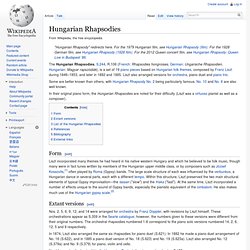
No. 10 and No. 6 are also well known. Frédéric Chopin. Photograph of Chopin by Bisson, c. 1849 Frédéric François Chopin (/ˈʃoʊpæn/; French pronunciation: [fʁe.de.ʁik ʃɔ.pɛ̃]; 22 February or 1 March 1810 – 17 October 1849), born Fryderyk Franciszek Chopin,[n 1] was a Romantic-era Polish composer.
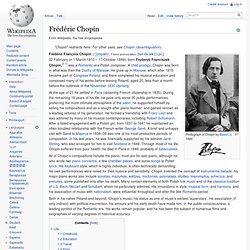
Mazurka. Mazurka rhythm.[1] History[edit] The folk origins of the mazurek are two other Polish musical forms—the slow kujawiak, and the fast oberek.
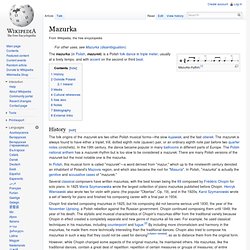
The mazurek is always found to have either a triplet, trill, dotted eighth note (quaver) pair, or an ordinary eighth note pair before two quarter notes (crotchets). In the 19th century, the dance became popular in many ballrooms in different parts of Europe. The Polish national anthem has a mazurek rhythm but is too slow to be considered a mazurek. In Polish, this musical form is called "mazurek"—a word derived from "mazur," which up to the nineteenth century denoted an inhabitant of Poland's Mazovia region, and which also became the root for "Masuria".
Chopin first started composing mazurkas in 1825, but his composing did not become serious until 1830, the year of the November Uprising, a Polish rebellion against the Russian government. Robert Schumann. Robert Schumann[1] (8 June 1810 – 29 July 1856) was a German composer and influential music critic.
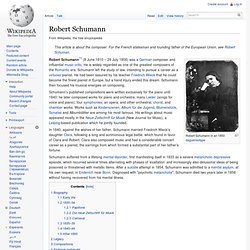
He is widely regarded as one of the greatest composers of the Romantic era. Schumann left the study of law, intending to pursue a career as a virtuoso pianist. He had been assured by his teacher Friedrich Wieck that he could become the finest pianist in Europe, but a hand injury ended this dream. Schumann then focused his musical energies on composing. Dichterliebe. Dichterliebe, 'The Poet's Love' (composed 1840), is the best-known song cycle of Robert Schumann (Op. 48).
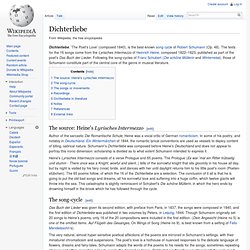
The texts for the 16 songs come from the Lyrisches Intermezzo of Heinrich Heine, composed 1822–1823, published as part of the poet's Das Buch der Lieder. Following the song-cycles of Franz Schubert (Die schöne Müllerin and Winterreise), those of Schumann constitute part of the central core of the genre in musical literature. The source: Heine's Lyrisches Intermezzo[edit] Heine's Lyrisches Intermezzo consists of a verse Prologue and 65 poems.